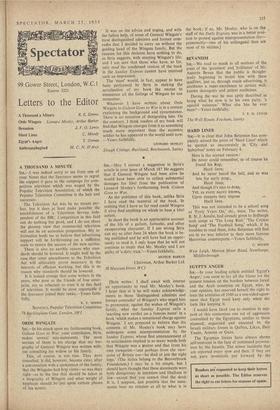SIR,—May I correct a suggestion in Strix's article in your
issue of March 18? He suggests that if General Wingate had been alive he would. have been able to collect substantial damages for libel from the publication of Leopard Mosley's forthcoming book Gideon Goes to War.
As the publisher of this book, unlike Strix I have read the material of the book. In nothing that I have so far read could Wingate if alive find anything on which to base a libel action.
In short the book is an appreciative account of the life of a gallant, fantastic, and often exasperating character. If I am wrong Strix can say so after June 24 when the book is be- ing published and he will have had an oppor- tunity to read it. I only hope that he will not continue to imply that Mr. Mosley and I are guilty of 'a dirty trick.'—Yours faithfully, ARTHUR BARKER Chairman, Arthur Barker Ltd. 30 Museum Street, WCI
[Strix writes : I shall await with interest an opportunity to read Mr. Mosley's book. I hope that in it he will make acknowledge- ments to those 'distinguished admirers and former comrades' of Wingate's who urged him to pronounce, against the wishes of Wingate's family, what the Sunday Express calls a 'startling new verdict on a famous name' in a book 'which makes a sensational charge against Wingate.' I am prepared to believe that the contents of Mr. Mosley's book may have undergone some misrepresentation by the Sunday Express, whose first announcement of its serialisation implied in so many words both that Wingate was a traitor and that from his own viewpoint—'and perhaps from the view- point of Britain too—he died at just the right tirpe.' (The italics belong to the Beaverbrook Foundation,) I may be a bit simple, but I should have thought that these statements were both denigratory in intention and libellous in law—except that you cannot libel the dead. It is. I suppose, just possible that the state- ments bear no relation at all to what is in the book; if so, Mr. Mosley, who is on the staff of the Daily Express, was in a better posi- tion to protest against misrepresentation (by- presumably—one of his colleagues) than are most of its victims.]


































 Previous page
Previous page